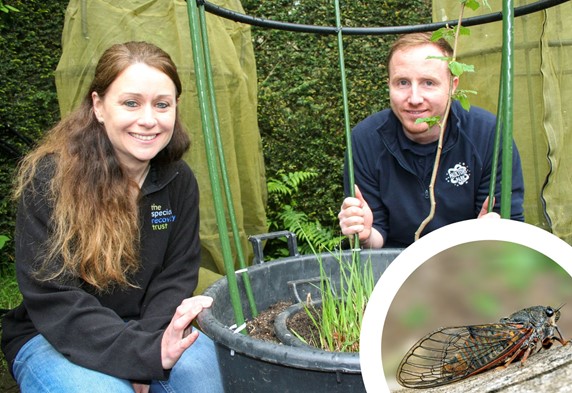In 2023 Paultons Park became a project partner of The Species Recovery Trust’s (SRT) New Forest Cicada project.
The New Forest Cicada, Cicadetta montana, was once found across the New Forest National Park but there have been no confirmed sightings since the 1990s.
The SRT has been looking for cicadas in the New Forest for the past ten years but has not made a single sighting. The Trust has assessed the habitat management techniques the species needs to survive and has worked with Forestry England to put this management in place, so they are now ready to attempt a reintroduction.
Given the New Forest is already at the northern edge of the species’ natural range, climate change might also favour the reintroduction.

The SRT team are planning to retrieve cicadas of the same species in Slovenia and bring them back to England and start a new population in the forest.
Bringing live adults back to the UK has never been attempted before, and any cicada nymphs that hatch this year will spend the next six-to-eight years underground feeding on plant roots, so it will be impossible to know whether even the first step of the reintroduction has been successful until 2030 at the earliest.
The team at Paultons Park are leading the zoo breeding and management elements of the project and have constructed several rearing units for housing cicada adults and nymphs. The large, netted plant pots contain local plant species, including hazel and hawthorn saplings, and purple moor grass to provide suitable foraging, shelter and egg laying opportunities for the arriving cicadas.
As part of the setup, indoor observation rearing tanks have also been built to allow progress to be monitored of the developing nymphs, including their feeding habits and movements.
Jack Williams, Assistant Zoo Manager said: “To be part of a project involving a local species is really exciting. We have hopefully created a suitable environment to allow the cicadas to thrive and it will be fascinating for us to see the project progress. We have our fingers crossed the Species Recovery Trust team will be successful in collecting the adults.”
Related Members
-
News
.png?w=100&h=100&zc=1&f=jpeg&hash=97e6d151315c515d23f80e6ee9d1d533) BIAZA Blog: How Accreditation is creating change at BIAZA 25th February, 2026After two years of BIAZA Accreditation, the team delivers a look ahead on the programme to support and boost world-class zoos…
BIAZA Blog: How Accreditation is creating change at BIAZA 25th February, 2026After two years of BIAZA Accreditation, the team delivers a look ahead on the programme to support and boost world-class zoos… -
News
.png?w=100&h=100&zc=1&f=jpeg&hash=a0b01e801771c24b4d7f5c3df4abed98) Twycross Zoo Welcomes Its First Baby of 2026: An Endangered Pileated Gibbon 19th February, 2026Conservation charity, Twycross Zoo, is celebrating a heart-warming milestone with the arrival of its first baby of 2026 - an endangered pileated gibbon,…
Twycross Zoo Welcomes Its First Baby of 2026: An Endangered Pileated Gibbon 19th February, 2026Conservation charity, Twycross Zoo, is celebrating a heart-warming milestone with the arrival of its first baby of 2026 - an endangered pileated gibbon,… -
News
.png?w=100&h=100&zc=1&f=jpeg&hash=c8eadb7dce959e1a8e6be51070cd0b3b) Conservation breeding success as Endangered spotted deer fawn is born at Bristol Zoo Project 19th February, 2026An extremely rare spotted deer fawn has been born at Bristol Zoo Project, marking another important conservation milestone for this Endangered species.…
Conservation breeding success as Endangered spotted deer fawn is born at Bristol Zoo Project 19th February, 2026An extremely rare spotted deer fawn has been born at Bristol Zoo Project, marking another important conservation milestone for this Endangered species.…



